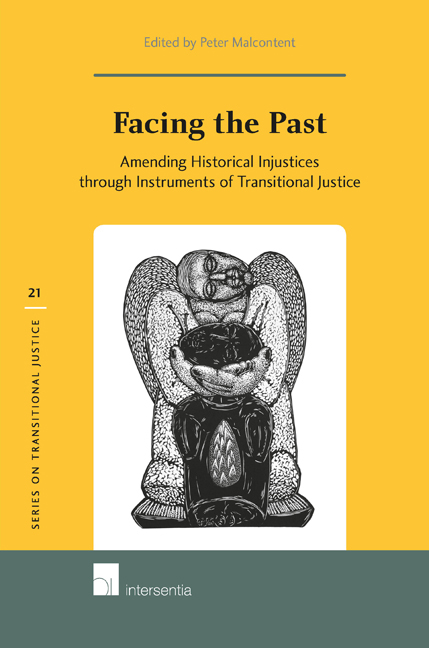Book contents
- Frontmatter
- Acknowledgements
- Contents
- PART I TRANSITIONAL JUSTICE. WHAT'S IN THE NAME?
- PART II RETRIBUTIVE JUSTICE
- PART III RESTORATIVE JUSTICE
- Introduction
- The Whole Truth and Nothing but the Truth? On the Role of Truth Commissions in Facing the Past
- Official Apologies
- Financial Compensation as a Political Process
- Education in the Shadow of History. Education, History Education, and Their Place in Historical Justice
- Governing through Repair. Historical Injustices and Indigenous Peoples in Canada
- PART IV PENDING CASES
- Author Information
Introduction
from PART III - RESTORATIVE JUSTICE
Published online by Cambridge University Press: 15 December 2017
- Frontmatter
- Acknowledgements
- Contents
- PART I TRANSITIONAL JUSTICE. WHAT'S IN THE NAME?
- PART II RETRIBUTIVE JUSTICE
- PART III RESTORATIVE JUSTICE
- Introduction
- The Whole Truth and Nothing but the Truth? On the Role of Truth Commissions in Facing the Past
- Official Apologies
- Financial Compensation as a Political Process
- Education in the Shadow of History. Education, History Education, and Their Place in Historical Justice
- Governing through Repair. Historical Injustices and Indigenous Peoples in Canada
- PART IV PENDING CASES
- Author Information
Summary
TRUTH AND RECONCILIATION
When in the 1980s Huntington's third wave of democratisation washed over the Latin American continent, regime change hardly resulted in the use of criminal justice. Unlike their Eastern European counterparts in Hungary, Poland and Czechoslovakia, where the communist regimes after 1989 completely imploded, the new democratic regimes in Latin America still had to reckon with their military predecessors who in most cases had not been defeated, but more or less had returned to their barracks voluntarily. In exchange for their withdrawal from power, the military leaders had almost invariably posted two conditions: respect for the institutional role and autonomy of the military and a pledge that there would be no prosecutions, punishment or other retaliation against military officers for any acts they may have committed when they were in power. In other words, the political costs of using criminal justice to deal with the atrocities of the past would outweigh the moral gains of putting former junta members behind bars.
The new democratic rulers of countries such as Argentina and Chile, where the dirty wars against alleged communists had resulted in tens of thousands of involuntary disappearances, nevertheless realised that they had to do something. A clear signal had to be presented that would not only mark the end of the dark and undemocratic past, but that at the same time would serve as a symbol of the legitimacy of the new rulers’ own powerbase. Moreover, although the new democratic governments realised that their margins to operate were small, they could not completely close their ears to the cry for justice from the relatives of the disappeared.
In Argentina the ‘Mothers of the Plaza de Mayo’ had demonstrated since 1977 to obtain the truth about the fate of their beloved, taken away during Nacht und Nebel actions. Therefore in 1983 when the military regime imploded due to economic decline and a failed attempt to conquer the Malvinas (Falklands), it correctly feared that its democratic successor would not leave the junta's past for what it was.
Information
- Type
- Chapter
- Information
- Facing the PastAmending Historical Injustices Through Instruments of Transitional Justice, pp. 205 - 224Publisher: IntersentiaPrint publication year: 2016
